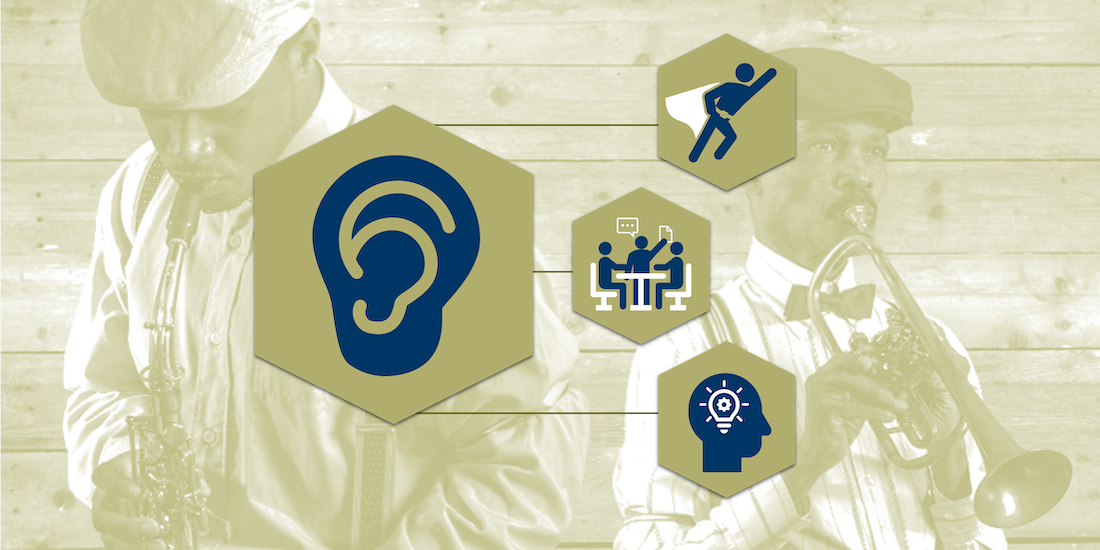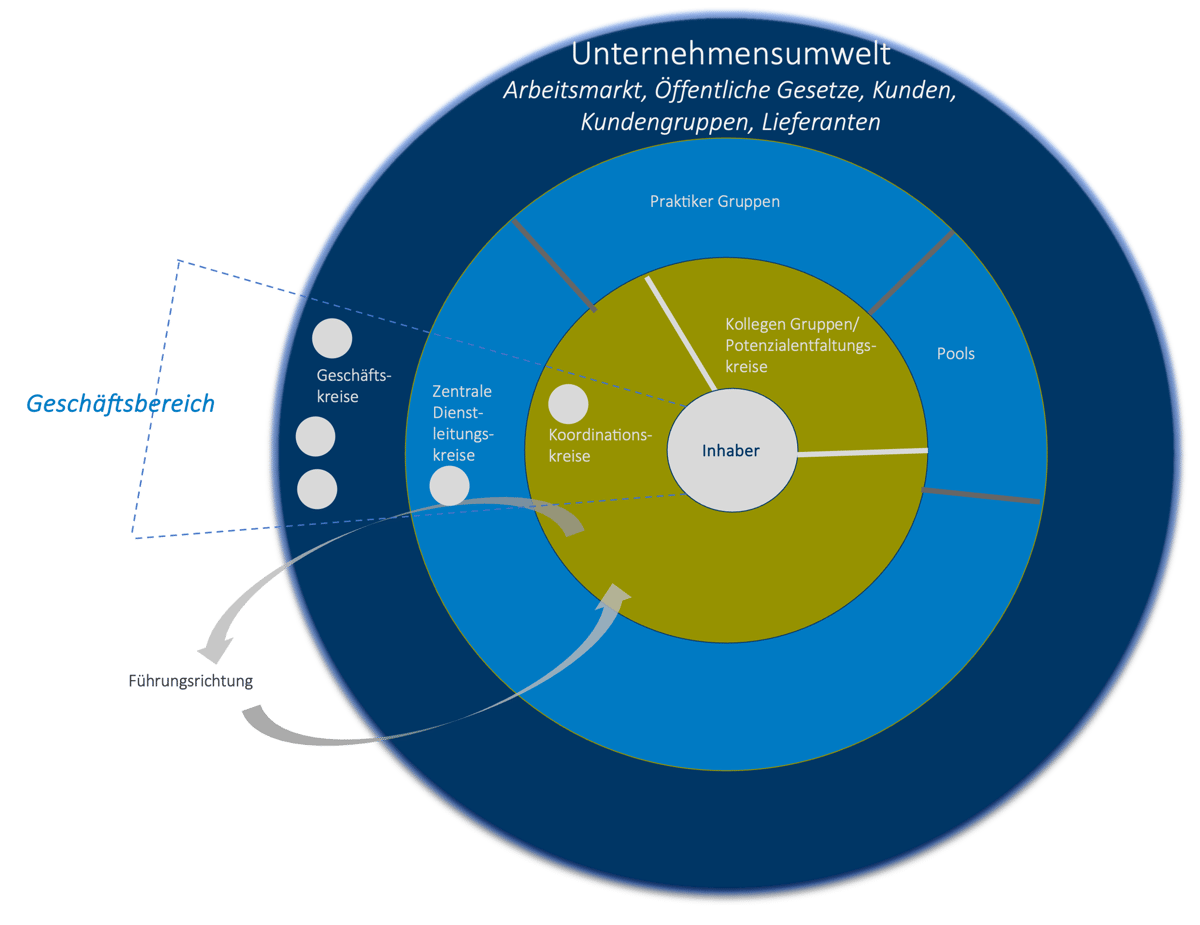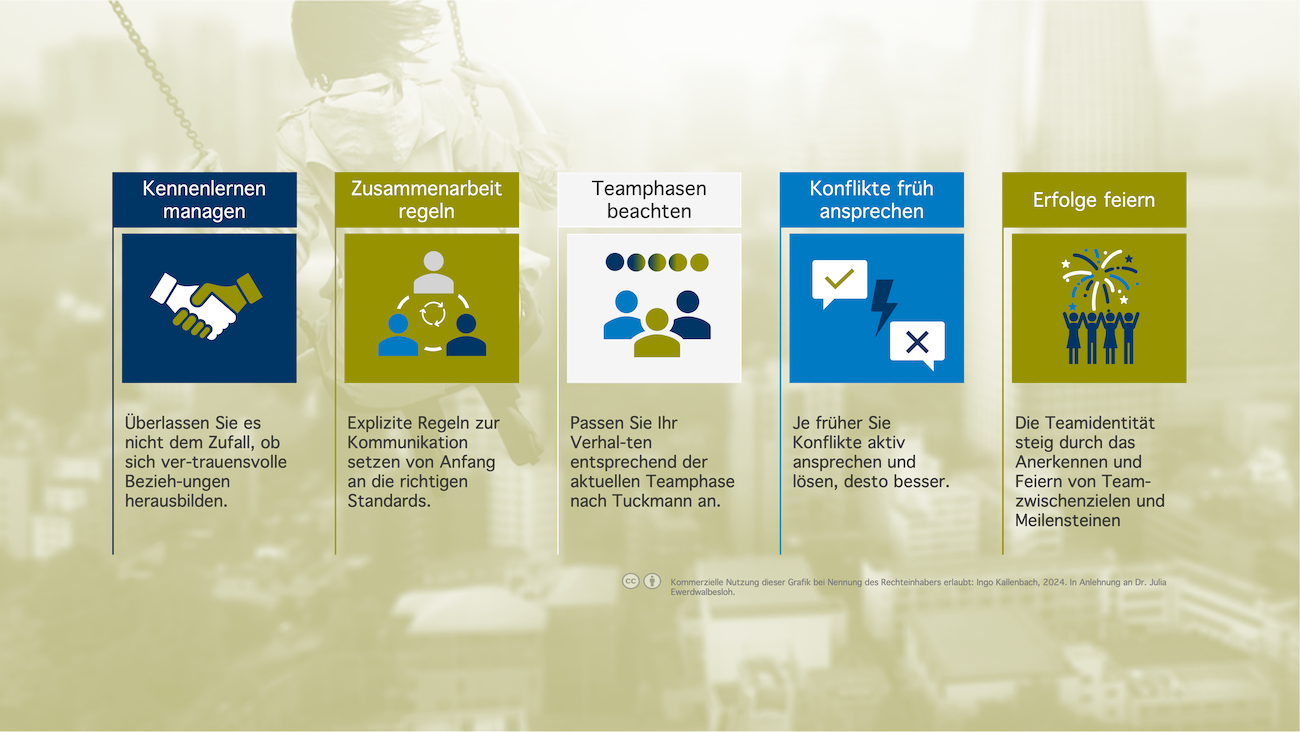
Unternehmensberatung für Gesunde Transformation
Breit in den Themen, tief in den Details.
Direkt mit einem Experten sprechen?
-

Umfassende Begleitung in der Agilen Transformation. Statt auf dauerhafte Stabilität setzen wir auf einen permanenten Anpassungsprozess, der Experimentieren, Ausprobieren und stetige Weiterentwicklung als neue Normalität etabliert. Unser Fokus liegt auf der agilen und flexiblen Gestaltung der kulturellen Rahmenbedingungen der gesunden Organisation, um die Transformation als einen fortlaufenden Prozess zu verstehen und zu implementieren.
-

Gezielte Führungskräfteentwicklung zur Verbesserung der Führungskompetenz. Durch unsere Expertise haben wir in zahlreichen Kundenprojekten Unternehmen erfolgreich dabei unterstützt, vorhandenes Führungspotenzial zu identifizieren, Verantwortliche nachhaltig zu fördern, talentierte Nachwuchskräfte zu binden bzw. zu gewinnen sowie einen aussagekräftigen Talent-Pool aufzubauen. Unser Fokus liegt dabei besonders auf der Erkennung der Entwicklungsfähigkeit, um ungenutzte Reserven und damit verbundene Möglichkeiten effektiv zu erschließen.
-

Ganzheitliche Unterstützung im Bereich der strategischer Personalentwicklung. Wir setzten uns nicht nur die individuelle Weiterbildung der Mitarbeiter ein, sondern optimieren auch die Teamzusammenarbeit. Dabei verstehen wir die Personalentwicklung als eine durchdachte Verkettung von Maßnahmen, die direkt von den Unternehmenszielen abgeleitet werden, um sicherzustellen, dass die Mitarbeiter die erforderlichen Fähigkeiten entwickeln, um den Unternehmenserfolg zu gewährleisten.
-

Umfassendes und objektives Leistungsangebot in der Management-Diagnostik. Durch effektive diagnostische Methoden steigern wir nicht nur die Fairness und Nachvollziehbarkeit von Entscheidungen im Bereich Nachfolge, Karriereweg und Recruiting, sondern ermöglichen auch eine fundierte Entscheidungssicherheit, strategisch sinnvolle Personal- und Führungskräfteentwicklung sowie die Bildung eines effektiven Führungsteams durch reichhaltige Informationen und Monitoring-Möglichkeiten.
-

Unser Leistungsangebot im Change-Management fokussiert auf hohe Transparenz, klare Pläne und eindeutige Zwischenschritte, um effektiven Wandel voranzutreiben. Durch eine strukturierte Kommunikation schaffen wir Klarheit und Fokus. Wir schaffen Maßstäbe für Verhaltensänderungen und strukturell-kulturellen Wandel und ermöglichen Organisationen, sich proaktiv auf täglichen Wandel einzustellen. Stets im Einklang mit unternehmerischen Werten.
-

Wir unterstützen Sie im Bereich Workplace Change, um die Arbeitsumgebung, Zusammenarbeit und Kommunikation optimieren. Wir verstehen die Bedeutung der Wechselwirkung zwischen physischem Raum, Unternehmenskultur, Beziehungspflege und Führungsaspekten. Wir integrieren diese Elemente effektiv im Workplace Change und nutzen dieses Wissen für optimale Verbindung zwischen Umfeld und Umgang.
-

Im Bereich Coaching arbeiten wir mit auf erfahrenen und kompetenten Coaches, die strukturiert und systemisch "Hilfe zur Selbsthilfe" geben. Alle bringen ein vertieftes fachliches Verständnis im Management und Führungsbereich mit. Durch eigene Führungserfahrung arbeiten sie auf Augenhöhe mit den Coachees und legen besonderen Fokus auf eine vertrauensvolle Beziehung als Grundlage für einen zielorientierten Begleitungsprozess.
-

Wir begleiten Sie in einem kulturprägendem Leitbildprozess, der die verschiedene Aspekte Ihrer Organisation berücksichtigt. Dabei liegt uns die Zukunftsfähigkeit besonders am Herzen. Wir gestalten Leitbildprozesse für verschiedene Anlässe und Anliegen wie z. B. Führung, Transformation, Projektvision oder strukturelle Umorganisation. Aus diesem systemischen Ansatz heraus, entwickeln wir Prinzipien, Verhaltensanker und Werte, die im Einklang mit der individuellen Zielsetzung sind. Leitbilder verstehen wir als Ausblick auf eine erstrebenswerte Zukunft.
-

Unser Team entwickelt für Ihr Unternehmen wegweisende Ansätze zur Förderung einer kollegialen Führung und Kreisorganisation. Durch den Einsatz innovativer Methoden schaffen wir eine kooperative Unternehmenskultur, in der die Mitarbeiter aktiv in Entscheidungsprozesse eingebunden sind und Kreisstrukturen eine effektive und agile (Selbst-)Führung ermöglichen.
Wir gestalten gemeinsam mit Ihnen ein erfolgreiches und gesundes Unternehmensumfeld.
Wir begleiten Sie in die Zukunft der Arbeit:

Unternehmen agilisieren
Umfassende Begleitung in der Agilen Transformation. Statt auf dauerhafte Stabilität setzen wir auf einen permanenten Anpassungsprozess, der Experimentieren, Ausprobieren und stetige Weiterentwicklung als neue Normalität etabliert. Unser Fokus liegt auf der agilen und flexiblen Gestaltung der kulturellen Rahmenbedingungen der gesunden Organisation, um die Transformation als einen fortlaufenden Prozess zu verstehen und zu implementieren.

Führungskräfte qualifizieren
Gezielte Führungskräfteentwicklung zur Verbesserung der Führungskompetenz. Durch unsere Expertise haben wir in zahlreichen Kundenprojekten Unternehmen erfolgreich dabei unterstützt, vorhandenes Führungspotenzial zu identifizieren, Verantwortliche nachhaltig zu fördern, talentierte Nachwuchskräfte zu binden und zu gewinnen sowie einen aussagekräftigen Talent-Pool aufzubauen. Unser Fokus liegt dabei besonders auf der Erkennung der Entwicklungsfähigkeit, um ungenutzte Reserven und damit verbundene Möglichkeiten effektiv zu erschließen.

Mitarbeiter strategisch entwickeln
Ganzheitliche Unterstützung im Bereich der strategischer Personalentwicklung. Wir setzten uns nicht nur die individuelle Weiterbildung der Mitarbeiter ein, sondern optimieren auch die Teamzusammenarbeit für zielgerichtete Konfliktlösung. Dabei verstehen wir die Personalentwicklung als eine durchdachte Verkettung von Maßnahmen, die direkt von den Unternehmenszielen abgeleitet werden, um sicherzustellen, dass die Mitarbeiter die erforderlichen Fähigkeiten entwickeln, um den Unternehmenserfolg zu gewährleisten.

Management Diagnostik
Umfassendes Leistungsangebot in der Management-Diagnostik. Durch effektive diagnostische Methoden steigern wir nicht nur die Fairness und Nachvollziehbarkeit von Entscheidungen im Bereich Nachfolge, Karriereweg und Recruiting, sondern ermöglichen auch eine fundierte Entscheidungssicherheit, strategisch sinnvolle Personal- und Führungskräfteentwicklungsowie die Bildung eines effektiven Führungsteams durch reichhaltige Informationen und Monitoring-Möglichkeiten.

Veränderungen voranbringen
Unser Leistungsangebot im Change-Management fokussiert auf hohe Transparenz, klare Pläne und eindeutige Zwischenschritte, um effektiven Wandel voranzutreiben. Durch die Kommunikation eines klaren Plans schaffen wir Klarheit und einen Maßstab für Verhaltensänderungen und strukturell-kulturellen Wandel, ermöglichen es Organisationen, sich proaktiv auf täglichen Wandel einzustellen und diesen im Einklang mit unternehmerischen Werten mitzugestalten.

Neue Arbeitswelten etablieren
Wir unterstützen Sie im Bereich Workplace Change, um die Arbeitsumgebung, Zusammenarbeit und Kommunikation optimieren. Wir verstehen die Bedeutung der Wechselwirkung zwischen physischem Raum, Unternehmenskultur, Kommunikation und Führungsaspekten, und integrieren diese Elemente effektiv im Workplace Change für eine ganzheitliche Optimierung von Umfeld und Umgang.

Coaching & Training zu Themen und Kompetenzen
Im Bereich Coaching arbeiten wir mit auf erfahrenen und kompetenten Coaches, die strukturiert und systemisch beraten. Alle bringen auch ein vertieftes fachliches Verständnis im Management und Führungsbereich mit. Durch eigene Führungserfahrung arbeiten sie auf Augenhöhe mit den Coachees und legen besonderen Fokus auf eine vertrauensvolle zwischenmenschliche Beziehung als Grundlage für einen interaktiven, lösungs- und zielorientierten Begleitungsprozess.

Strategien umsetzen: Kollegiale Führung
Unser professionelles Team entwickelt für Ihr Unternehmen wegweisende Strategien, um eine kooperative Führung und eine effiziente Kreisorganisation zu fördern. Durch den Einsatz innovativer Methoden schaffen wir eine inspirierende Unternehmenskultur, in der die Mitarbeiter aktiv an Entscheidungsprozessen teilnehmen und Kreisstrukturen eine agile und effektive Führung ermöglichen.
Ausgewählte Methoden und Produkte für eine erfolgreiche Umsetzung...
REFLECT in Zahlen
Berater*innen
Glückliche Kunden
Erfahrung seit
Sonnenstunden im HQ

Wir ermöglichen einen unbefristeten Arbeitsplatz in einem wachstumsstarken Unternehmen mit eigenverantwortlichem und selbstständigem Arbeiten, einem tollen Team mit netten Kolleginnen und Kollegen sowie flexible und vielseitige Aufgaben.
Aktuell suchen wir eine*n
Mitarbeiter*in Vertrieb im Bereich Personal- und Organisationsentwicklung (m/w/d)
Klingt gut? Dann sieh dir schnell unsere aktuellen Jobs an.
Was wir machen

Balancierte Führung
Führungskräfte sind die Schlüsselfiguren eines jeden Unternehmens und stellen daher ein zentrales Systemelement dar, welches es zu fördern gilt. Dabei ist es entscheidend, die individuellen Potenziale und Stärken jeder Führungskraft zu erkennen, zu fokussieren und zu fördern, um so eine außergewöhnliche Leistung im Team zu erreichen und gesamtorganisationale Potenziale zu entfalten.

Gesunde Transformation
Werden Sie eine agile und adaptive Organisation, für die Wandel nicht die Ausnahme, sondern eine Selbstverständlichkeit ist. Auf diesem Weg gibt es zahlreiche neue Organisationsformen, die für Ihr Unternehmen passend sein können: Von der agilen Netzwerkorganisation über holakratische Ansätze bis hin zu ambidexteren Betriebssystemen, in denen klassische, hierarchische Organisationsformen mit Netzwerkorganisationen harmonieren.

Strategische Personalentwicklung
Potenzialentfaltung gelingt mit einer gesamtorganisationalen Grundhaltung, die der Entfaltung von Potenzial positiv gegenübersteht.
Denn, um Potenziale identifizieren und realisierenzu können, muss ein konstruktiver Kontext geschaffen werden, in dem sich Mitarbeiter authentisch und sicher fühlen.
Es ist die zentrale Aufgabe der Verantwortlichen, entsprechende Arbeitsbedingungen zu schaffen.
Potenzialentfaltung hat direkte positive Auswirkungen auf essentielle Erfolgsfaktoren: höheres Engagement, stärkere organisationale Anpassungsfähigkeit und eine positivere organisationale Energie.

Neue Arbeitswelten
Die Qualität im Umfeld und die Qualität im Umgang sind
maßgebliche Treiber für die Mitarbeiter*innen. Die Infrastruktur
heutiger Büros hinkt den Anforderungen dieser Bedürfnisse
noch meist hinterher. Die Bedeutung des Raums
und die Qualität im Umgang hat erheblichen Einfluss auf die
Motivation der Mitarbeiter*innen und auf alle anderen Dimensionen einer Gesunden Organisation. Es sind die motivierten und leistungsfähigen Mitarbeiter*innen, die eine langfristige Wettbewerbsfähigkeit ermöglichen. Unternehmen tun deshalb gut daran, sich dieses Zusammenhangs bewusst zu werden, Arbeitswelten neu zu gestalten und Investitionen zu tätigen, um ihren Mitarbeiter*innen prosperierende Rahmenbedingungen zu bieten, in denen Bindung und Wachstum möglich sind.
Wir sind REFLECT
.jpeg)
Ingo Kallenbach
Geschäftsführer REFLECT
Andreas Jobmann

Jan Fischbach

Sebastian Amme

Dorothee Adolph

Andrea Brunner

Klaus Eckrich

Andrea Friedrich

Timo Niederberger

Birgit Stetter

Susanna Ulrich

Max Wittpoth

Tina Gerbec

Klaus Eckrich

Alexander Decruppé

Sven Bartel

Jennifer Uhrig

Katharina Leopold

Nicole Khan

Carolin Merz

Natalie Kuba
Whitepaper
Einmal herunter geladen stehen Ihnen unsere kostenlosen Whitepaper jederzeit als nützliche Nachschlagewerke oder auch für Impulse in Ihrer Arbeit zur Verfügung. Wählen Sie aus - ganz nach Ihren Interessen - und profitieren Sie von unserem Know-how.
Kommen Sie mit uns ins Gespräch...
und lassen Sie uns gemeinsam Ihre Möglichkeiten potenzieren!
REFLECT Notizen
Eine Dosis Inspiration gefällig? Wir versorgen Sie mit fundiertem Know-How und spannenden Einsichten rund die Themen agile Transformation, Führung und Personalentwicklung.








.jpg)










